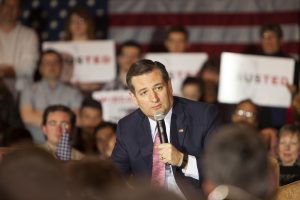There hasn’t been a Senate-confirmed assistant secretary of state for South and Central Asia since January 2017, when Nisha Desai Biswal stepped down in the final days of the Obama administration. Under current circumstances, with the United States exiting Afghanistan, an officially confirmed top diplomat for the region would be useful. But there’s little hope for swift movement on President Joe Biden’s nominee, Donald Lu.
It’s not personal. Lu is among 60 State Department nominees waiting to be confirmed, according to data from the Partnership for Public Service.
While there are a number of reasons for the slow pace of confirmations, a recent CNN report suggests that Senator Ted Cruz is a particularly difficult obstacle. Cruz’s beef with the Biden administration, playing out as “holds” on nominees, boils down to a single issue: Nord Stream 2.
Cruz told CNN, “I look forward to lifting the holds just as soon as they impose the sanctions on Nord Stream 2 that are required by federal law.”
Given reports today that Washington has struck a deal with Germany to allow Nord Stream 2, a controversial pipeline from Russia to Germany, to proceed, Cruz isn’t getting what he wants. Under the apparent deal, Washington will cease trying to block the pipeline and Germany, in exchange, will invest in green technology infrastructure in Ukraine. As the Washington Post reported, the natural gas pipeline has been a headache lasting through three U.S. presidential administrations. Nearly completed, it was driving a wedge between the U.S. and Germany, running counter to Biden’s ambitions to restore America’s alliances.
Cruz’s demand for sanctions isn’t going to be met.
As John Hudson writes for the Post, “U.S. officials doubted that U.S. sanctions could ultimately prevent its completion and argued that a deal with Germany rather than a protracted fight offered the best outcome.”
In a statement on July 20, responding to rumors of the deal, Cruz called it “a generational geopolitical win for Putin and a catastrophe for the United States and our allies.”
The backlog of State Department nominees isn’t just Cruz’s fault, but CNN’s reporting suggests he’s the larges impediment in an already tangled process:
There are a number of factors at play, six sources familiar with the process told CNN: Cruz’s holds; Senate leadership not prioritizing State Department nominees; Republicans on the Senate Foreign Relations Committee using individual nominees as leverage to make demands of the administration; lawmakers appearing to slow-walk candidates, claiming they need more time to review nominees’ files; and a failure to get through some of those files expediently.
Two undersecretary positions, more than a dozen assistant secretary posts, and 29 ambassadorships are in some phase of the process between nomination and the necessary Senate confirmation before the officials can take up their jobs. These include not just Donald Lu, as noted above, but assistant secretaries for European and Eurasian affairs, East Asian and Pacific affairs, international narcotics and law enforcement affairs, and intelligence and research. Among the ambassadorships stalled short of confirmation are nominees for NATO, Germany, India, Turkey, and Vietnam. Although nominees for the undersecretary positions covering arms control and economic growth, energy, and the environment were reported out of committee favorably back in May, they’ve yet to be voted on by the Senate. (Shortly after this was published, Bonnie D. Jenkins was confirmed as undersecretary of state for arms control and international security by a 52-48 vote on July 21).
Now that Cruz is definitely not getting the sanctions he wants, it’s unclear how long his holds will remain in place. (Remember, there are other factors slowing the process so even a lifting of the holds won’t mean a flurry of confirmation votes). While individuals are doing these jobs at the State Department in an acting capacity, they are doing so without the authority that Senate confirmation confers. What this means is less staff doing more work with less authority at a time when the administration is trying to put diplomacy back at the forefront of American international engagement, especially in Asia.

































